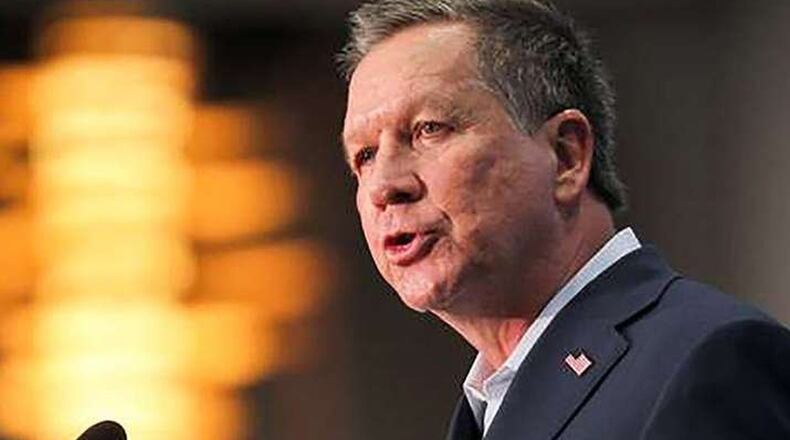“We are on the verge of recession in our state,” said Kasich, who took the helm of recession-ravaged Ohio in 2011 and will leave office in January 2019.
“But we’re not going to pass on to the next group. (House Speaker Cliff Rosenberger, R-Clarksville) and I are not going to pass on to the next governor the thing that got passed on to me, and to our legislature.”
Kasich’s comments signal a tough two-year state budget process ahead.
Soon after Kasich’s remarks, the Ohio Office of Budget and Management released numbers showing that tax receipts so far this fiscal year are down 1.2 percent from last year, nixing hopes that they would continue to grow as they had since 2014.
The numbers show the nearly $1.9 billion in tax receipts collected last month fell $99 million — or 5 percent — below projections. October’s tax receipts for the general fund were 4.7 percent below estimates.
Personal income tax receipts came in at $611 million — $70.8 million, or 10.4 percent, below projections.
The state collected nearly $848 million in sales taxes in November, which was 3.7 percent below projections. A large part of this is because federal regulators barred the state from taxing Medicaid-managed care plans.
Recent economic reports show Ohio’s economy is lagging much of the nation, which saw a 2.9 percent GDP increase in the third quarter of this year.
The state does have $2 billion in reserve funds, up from 89 cents in 2010.
State leaders and budget watchers say recession is far from assured, but its spectre should be a wake-up call.
“When I look at our budget and our budget priorities, I don’t feel like we’re investing in the kind of things that keep you out of recession,” said Ohio House Minority Leader Fred Strahorn, D-Dayton.
He said Ohio should invest more in things such as education and clean energy. The state could afford these programs and not face a deficit, he said, if GOP lawmakers hadn’t insisted on tax cuts.
“We just did another (tax cut) and we’re going to have a slightly more than $1 billion shortfall, which is equivalent to the income tax break we just gave to rich people,” he said.
Greg Lawson, policy director of the conservative Buckeye Institute, had a different approach to fending off recession. He said state lawmakers should do more to simplify Ohio’s complicated tax system of income taxes on the state and local level, and make other business-friendly reforms.
“We would say there’s more work that needs to be done to make the whole tax system, cumulatively speaking, better,” he said.
The state could do this and not face a deficit, he said, by cutting unnecessary spending.
“We have so many areas where there are programs that we could tweak or reform,” he said. “We are spending more than we need to.”
Brian Kollars contributed to this report.
About the Author

